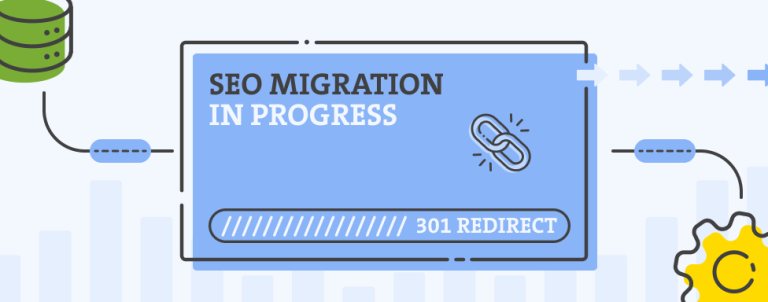Link building is often considered the best way to increase search traffic to a website.
However, it needs to be done correctly.
So, before going into this, you need to make sure you have a solid SEO foundation. In other words, you need to check that your website is:
- User-friendly: with easy navigation and excellent loading speed
- Up-to-date: with fresh and unique content that brings value to your visitors
- Free of any technical issues
Otherwise, all of your link building efforts will be in vain: wasting your time and money.
So once you have all the foundations in place, the only thing you have to do is learn the link building basics…

…which is exactly what I’m going to write about in this post.
So pay attention, and by the end of this post, you should know what makes good links and how you are going to build them (or, at least, try to build them 😉 ).
- What Is Link Building?
- Why Are Links Important To Your Business?
- What Makes A Powerful Backlink?
- Simple Link Building Tips for Beginners
- In House Link Building Vs Link Building Services
- On With the Building
What Is Link Building?
Knowing what link building is, is the first step in learning the link building basics. And it’s essential that you get those basics right because if you don’t understand the game, you can’t play it.
Link building in basic terms is finding websites that publish similar content (in the same niche) and persuading them to include a link pointing to a relevant page on your site.
There is a range of strategies you can use to do this.
But for now, you need to understand that link building is usually a long process that requires time, patience, motivation, and a bit of luck (money?).
Is it worth it?
Yes, definitely!
The benefits you can get from link building can be incredible.
Why Are Links Important To Your Business?
First, having links is a positive signal for humans and Google.
For Google, links work as ‘votes’, so the more links/votes you get, the more likely it is you will be favored by Google.
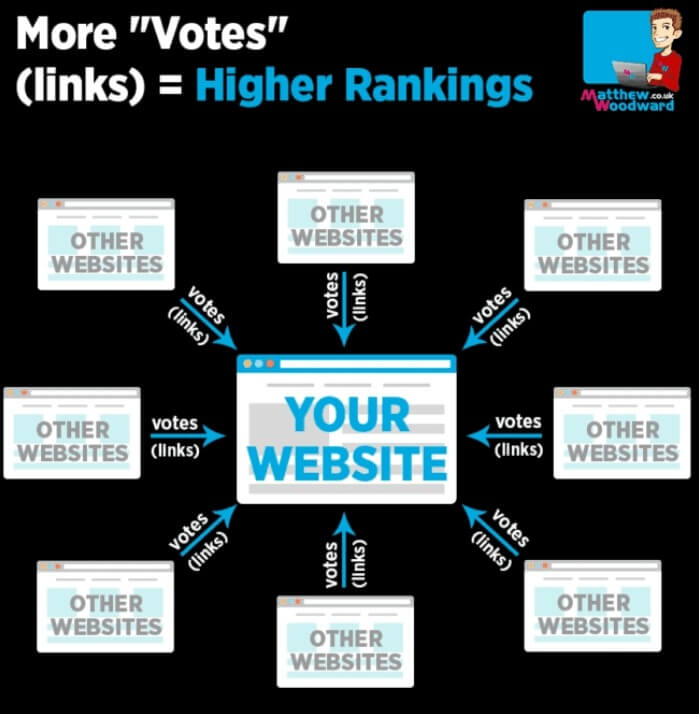
In Google’s eyes, links act as ‘endorsement’ or, if you prefer, as ‘proof’ of high-quality content.
Let me explain:
Google thinks that if someone offers a link to another website, it’s probably because it has great content that adds value to its visitors.
So it’s a trust signal.
And if Google trusts a website, visitors will too.
It’s that simple.
Google usually sends more traffic to sites that it trusts. And more search traffic means… more visitors, more conversions, and more sales!
However, quantity isn’t the only factor.
If you want this technique to be really effective, you need to think about the links’ quality first.
Indeed, not all links are equal. Some votes/links are stronger than others.
For example, if you get a link from the New York Times, it’s going to be way more powerful than a link from a brand new site.
Make sense?
Good, because now I’m going to show you in detail what makes a good link and how you can build them to move the ranking needle.
What Makes A Powerful Backlink?
Now, if you want solid link building basics, you need to know about 4 things:
1. Relevancy
Ideally, you want to get a link from a site in the same niche as yours.
What does that mean?
Well, that means that you want your content to be linked to a related topic/piece of content.
For example, if your content is about global warming, you might want it to be linked to from:
- Articles speaking about natural catastrophes caused by global warming
- Posts talking about how to reduce your impact on the environment
- Pages of associations that fight against global warming
…and so on.

By doing this, people that are reading about global warming on the internet might end up on your website.
2. Domain Strength
As I explained previously, all the links are not equally seen by Google.
Google wants to see powerful links coming from well-known websites with high authority.
Basically, if you get a link from a famous international newspaper, it’s going to have more weight than if you got a link from your local hometown newspaper.
Why?
Well, because it’s going to get way more visibility.
And more visibility means that you’ll get more:
- Traffic
- Credibility
- Site authority
Remember this – if you get backlinks from a high-authority website – then your website will increase its own authority.
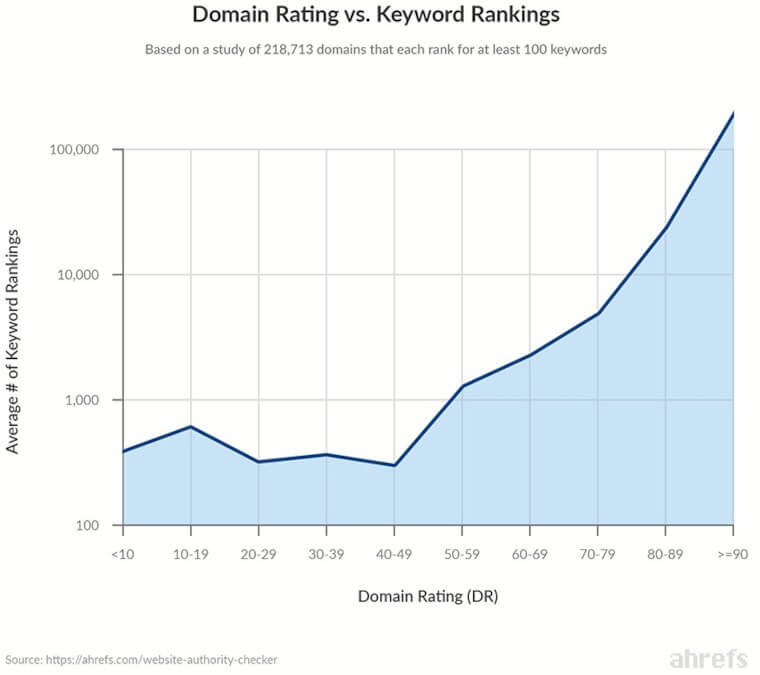
So, even if it requires a bit of work to get those links, it’s totally worth it.
3. Page Strength
The page where your link will be placed plays a crucial part.
Ideally, you want your link to be placed on a popular page that already gets search traffic.
This will help you share the link juice from their site.
If you are placing a link within a guest article then providing high-quality content is essential to ensure the page quickly grows in strength.
4. Anchor Text
The anchor text is the text your link is placed on. It is important to review your anchor text across your backlink profile and compare it against your competitors.
That way you can see if they are using more of a certain type of anchor to get the top ranking spots. For example, if the page ranking in the top position for your target keyword only uses ‘branded’ anchor text, so should you.
When starting out, it is better to have a mix of exact match, branded, URL, topical and misc anchors. Then when you are in a position to fight for the top spots you can tailor your anchor strategy to take out the competition.
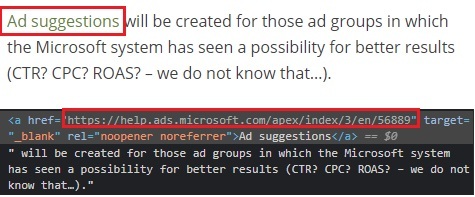
Simple Link Building Tips for Beginners
Now that you know what good links are made of, it’s time to learn how to build them. It’s not as easy as it seems, but, for all good things in life – you have to put some effort into it.
I am going to write some basic, and relatively easy, ways to build your links. But remember one thing – to maximize your results it would be best to implement them all at once.
Because some of them will work, some of them will not.
1. Build Links to Your Blog
Do not even try to build links to your web without content to link to.
Simple rule, isn’t it?
But, yet again… How to create that content? The simplest and best way is to start writing blog posts on your website.
If you don’t know what to write about – ask yourself this question: Why did I start this website?
Just focus on writing about what you know best. Focus on your industry and draw ideas from it. For example: What are the most common problems? How to resolve them? News about your industry and how will it affect your business?

Once you start writing blog posts – write them regularly. The good thing is that as you are writing them – it is becoming easier and easier to do.
It’s like everything in life. Once you get used to it – you are doing it without breaking a sweat. It’s almost like we are writing it in a semi-automatic way.
But, sometimes it’s just not enough to write simple text. Some of the other ideas to write on your website blog post section are:
a) Lists Blog Posts
There is something almost “magical” about list blog posts. And it is very closely related to how our brains are operating.
For example, let’s assume that we are writing a new blog post about things you need to be careful of when redesigning your eCommerce website.
Which title you would click on:
“Things to watch for when redesigning your eCommerce website.”
Or
“Top 5 things to watch out for when redesigning your eCommerce website”
The second one is the winner, right?
People just love “numbers” and lists in which they can find out something new. Even if the new information is only one, or two, points from those top 5 things…
There is even online research about what exact numbers users click on most. Hint: it is not 5 😉
b) Infographics
Infographics are one of the most popular types of content that gets many shares on social networks. And if it becomes popular – you will get many backlinks to your website.
The popularity of infographics is because some users find it easier to learn about something in a visual way. Because of that, it is not enough to have “only text” on your blog post section – you have to have it also in a more “visual” way.
Of course, given that infographic is done in a quality way.
And with interesting information.
If you are wondering where you can find interesting information – just look at your already written blog posts. If you have a “List” blog post – take the best one and turn it into an infographic.
As for visual way – there are many ways to do them, from freelancers to specific services.
Bonus tip: As users are going to share & publish your infographic, they could forget to mention you (insert a link to your website). Just kindly contact them and ask them.
You can find what websites published your infographic with reverse google image search.
c) Research
This is sometimes a difficult thing to do. Because it implies that you need to do (extensive) research in your field of interest and show some numbers and stats about it.
Writing a personal opinion about something is OK.
But, if you are bringing some valuable numbers, such that users from your industry will find interesting, then you will become (some type of) authority.
And when an authority publishes something – that content can earn a lot of links.
Bonus tip: do not forget to mention all the resources from which you collected/used data. And then inform them about your research. There is a great chance that they will put a link to your content from their website.
d) Case Studies
Do you have clients? Have you successfully improved their results?
Write about it.
Write thoroughly about the situation “before” you implemented your strategy/plan/magic, and then write about the achieved results.

Do not forget to insert results in a visual way (big numbers & big pictures).
People love to see & read about success stories. It’s also in some way psychological – they want the same results for themselves. So, when they see your case study – they will read it as they search for the idea/plan on how to improve their own results.
And they will also share it on social networks giving in return more possibility for you to earn your backlinks.
e) Guides/pdfs
People love guides that will help them. In a way, you are reading this because it is a half-guide for beginners on link-building.
But, true guides should be written even better (with more information) than simple blog posts, or list blog posts.
Because it is a guide and the user expects to find all the information they need to know about certain things. If you made it that way – all the people that find it useful will share it (link to it).
But, remember – it needs to include a lot (all) of information about a certain theme. It can take a lot of your time. But it can also bring a lot of benefits (links) because of it.
2. Ask for a Backlink
You are probably also reading a lot of other blogs from your industry or niche. Among them, you are finding some very interesting pieces of information.
Information that you also have already written about.
What if you could have a link from that website back to yours?
If you want it – just ask for it. Contact the owner of that blog and simply describe what you want.
Say that you find a certain post interesting, that you have also written something similar BUT with additional information that is not mentioned in his post, and that you think that readers of this blog would find it beneficial if there is a link to your website.
You will not know if the owners will say yes to your proposition until you ask them.
Simple, isn’t it?
3. Relationships/communities
Build relationships. Join communities in which they are talking about your industry or niche.
Then, engage with other users in those communities. From time to time share your content. But, do not share ONLY your content, share content from others too.

This is also beneficial in some other areas as well. For instance, you will connect with some interesting people from who you will gain insights or ideas you didn’t think of.
Also, if you actively participate in community activity you will become “recognized” and other members will share your content even if they didn’t read it!
Because, if they trust you – then there is no need to check what you wrote.
4. Newsletter
At first, it is somewhat difficult to see how a simple email can increase links to your website. But, think of it this way: It’s the start of a journey that consists of many steps that eventually bring you to the backlink.
When you publish a newsletter, you will increase your awareness.
Not every user has enough time to visit your site every day. That is why you are giving them the opportunity to check your content through the newsletter.
With quality content, you are increasing your chances of sharing that content. With enough shares, there is also a higher probability that you will get a backlink.
Additional tip: The best way to gain newsletter subscriptions is to try to convert your best blog posts into downloadable eBooks (or similar). But, if someone wants to download it – ask for their email first.
5. Give Expert Opinion
Are you an expert in a certain field?
If the answer is yes – find similar websites/blogs that are writing about that field. Then contact them and ask them if they are interested in accepting your testimonial or expertise about some topic.
But, this is only if you have something really good, or insightful to say.
Read what they have already written. If you find something that they have forgotten to include – just send them an email. Maybe they will like what you have to say. And then they will insert your “quote” with a backlink to your site.
Tip to consider: They will probably check your online presence – your website, your LinkedIn profile, Facebook profile, and so on. Be sure to show them that you are an “active” member of them all.
6. If Someone Mentions you on their Website
This is a rather easy thing to do. All you have to do is google (or DuckDuckGo it?) your brand name (or your name). If you find that someone has said something about you but didn’t put a link – contact him/her and ask for it.
They will probably do it.
You don’t need to google every single day. You could even put a google alert that puts your mentions in your email every time they happen.
In-House Link Building Vs Link Building Services
If all that is written above sounds too hard to do by yourself, then you have to think about two approaches to link building:
In-house
Or
Outsourcing
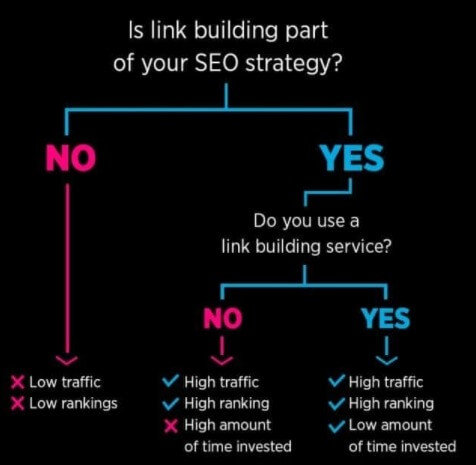
So, let’s see the differences between these.
1. In-House Link Building
In-house link building is when you decide to build your links internally. This means that you or your company has a dedicated team (or a person) that works full-time to build links.
Unlike what most people think, in-house link building isn’t the cheapest solution.
Indeed, having a team working full-time can get pretty costly with training and wages on top of the publishing fees you will be (very often) asked for.
However, there is a great advantage to consider with this option: it gives you complete control over the process.
It offers you the opportunity to choose:
- The strategies you want to implement
- The sources and placements of your links
But if you don’t think this is the right solution for your business, don’t worry. You can always outsource it to the experts.
2. Link Building Services
If you believe that link building is too much work or that you don’t have the necessary skills/resources to successfully complete this task, I suggest you outsource your link building.
But I know what you think:
‘How do I find a reliable link-building service? There are so many!’
And you’re right. It’s not an easy task…
So here is some advice:
- Avoid cheap services: Building good links costs money, so cheap prices are usually not a good sign.
- Avoid services that share site lists: If you can see the lists, Google can too. So if you place links on these sites you are saying to Google that you are buying links…which is totally against its guidelines.
- Avoid services that build links from sites with no search traffic: As I said before, you want your link placed on pages with high search traffic. If the site doesn’t have search traffic, the link holds much less value.
- Avoid services that don’t do quality control: Quality control is essential. The service needs to check the quality of your links before delivering them to you.
So if you notice one of these red flags, I highly suggest you find another service.
On with the building
So, now you know how important backlinks are for your online business. Anyone wishing to get their pages ranking well, from eCommerce stores to growth hacking agencies, must have link building as part of their SEO strategy.
Whether you do this yourself or hire a link building service, make sure you are building powerful links that add value to your pages.



